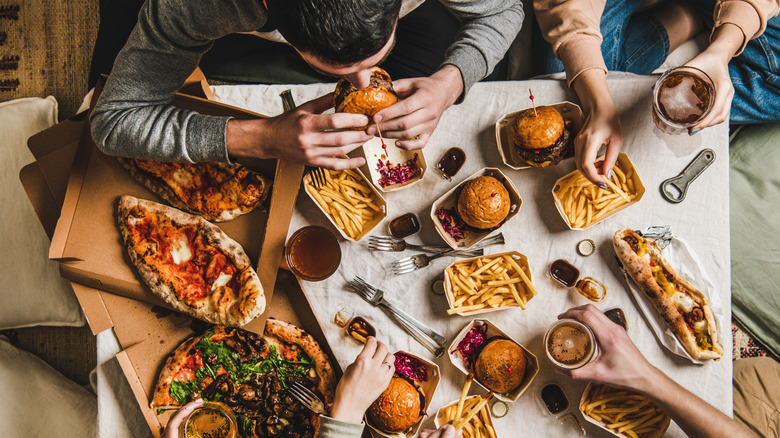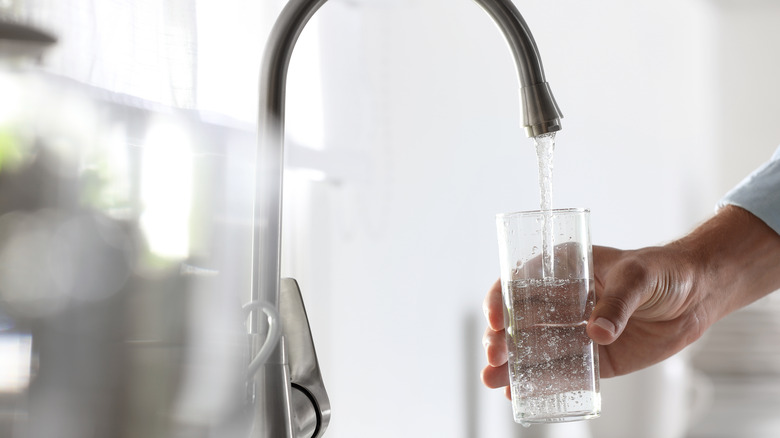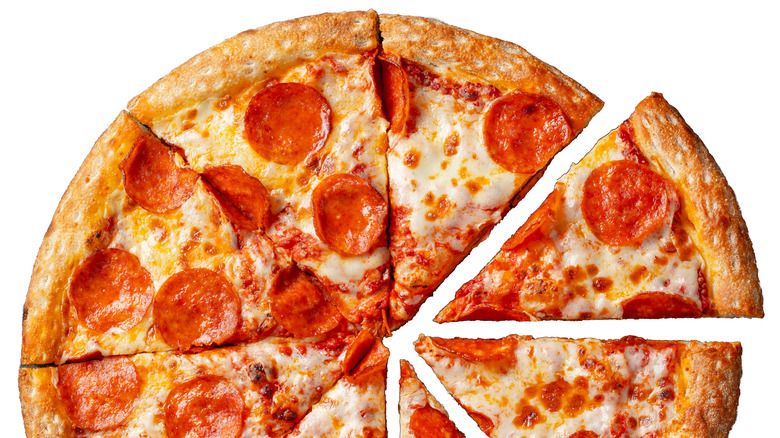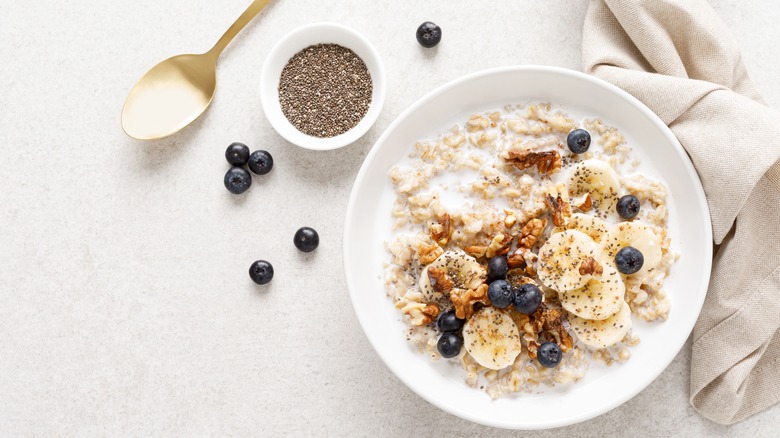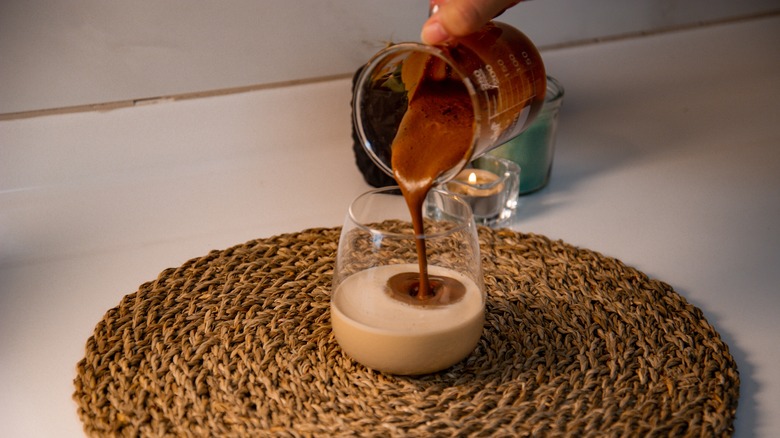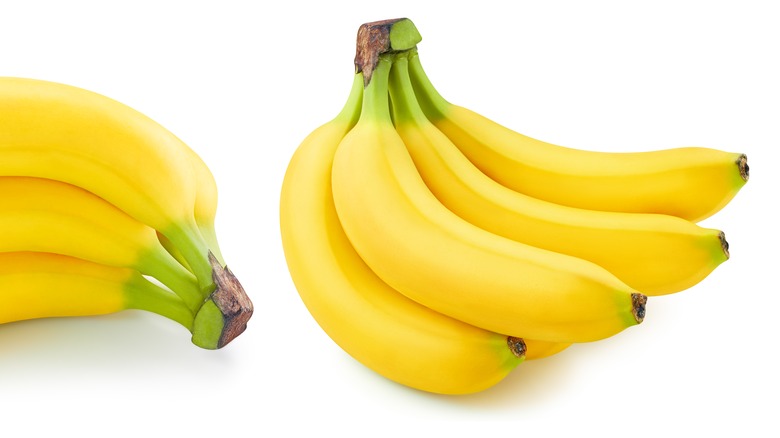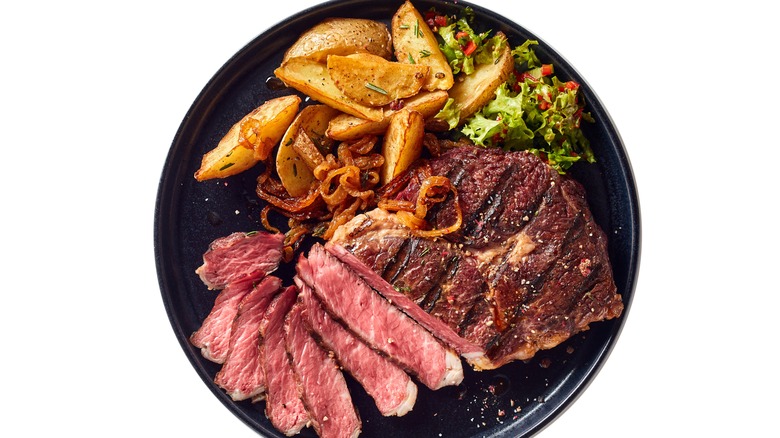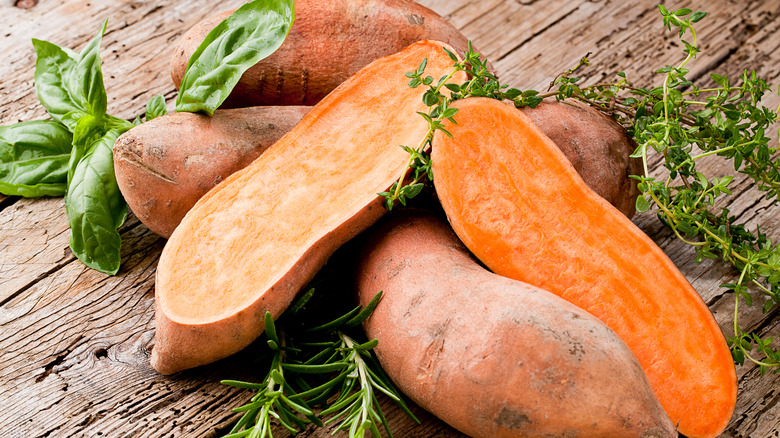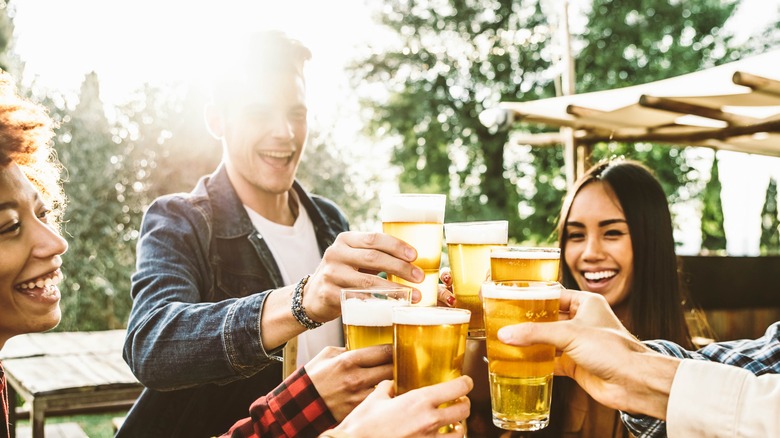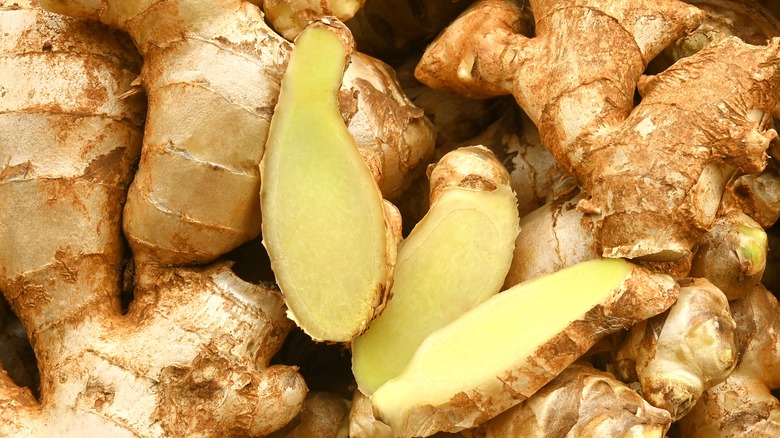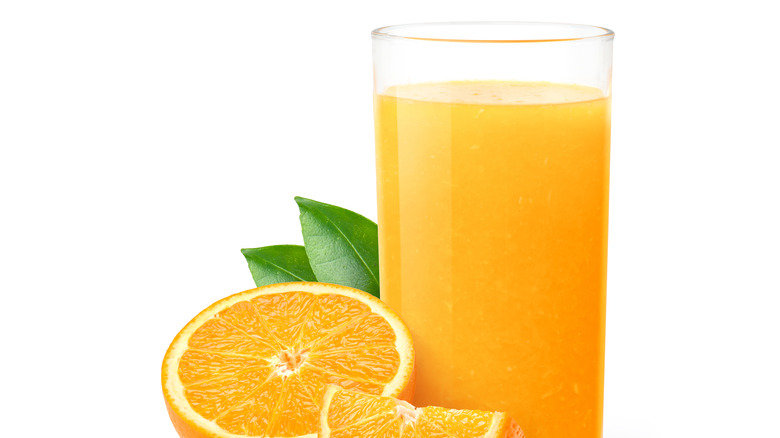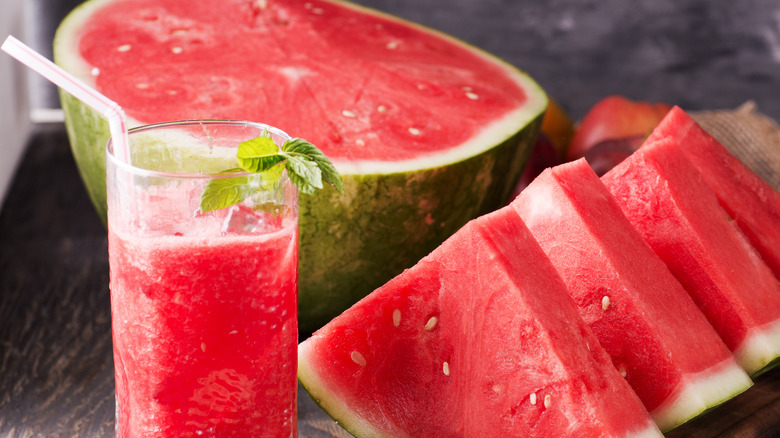6 Foods To Eat And 6 To Avoid When You Have A Hangover
So you had a few too many last night. If this isn't your first time at the rodeo, you may already know there are certain do's and don'ts when it comes to nursing a hangover, but you might be surprised to find out that some of your favorite hangover remedies have been blacklisted by experts who have your best interest at heart.
However, before we get into all of that, let's provide a quick rundown of what a hangover actually is. According to Healthline, there are several ways alcohol contributes to those icky feelings we all know and loathe the next day. For starters, alcohol is a diuretic, which contributes to dehydration and other uncomfortable symptoms. Sleep problems, gastrointestinal issues, and electrolyte imbalances are just a few more side effects of drinking alcohol to add on to the list. Certain foods can exacerbate these symptoms, or ease them. If you're curious to know which of these two categories your favorite hangover foods fall into, continue reading to learn more.
Drink: water
While this tidbit is probably the first trick you learned in "How to Nurse a Hangover 101," it's definitely worth repeating. As Healthline explains, alcohol acts as a diuretic. Diuretics cause you to pee more frequently than usual, thus leading to dehydration. When you are dehydrated you're more likely to experience those well-known symptoms of hangovers such as headaches, "the spins," and of course, excessive thirst. Furthermore, frequent urination can lead to electrolyte imbalances, which can also lead to uncomfortable symptoms such as headaches and moodiness.
Alcohol, more so than other liquids, leads your body to draw fluids from your blood (per Healthline). This process can be exacerbated by drinking on an empty stomach, and not pacing your alcoholic beverages with water. This is because alcohol goes straight from your stomach into your intestines and your bloodstream — a process that happens more quickly if there's nothing else in your digestive system. When you eat or drink non-alcoholic beverages with water, it slows down the amount of time it takes for alcohol to reach your bloodstream.
But even if you're chugging water in between your alcoholic drinks, it's still important to take in water the next day. Exercise physiologist Pete McCall spoke to Everyday Health and explained just why rehydration after drinking is so important: "Drinking water helps restore necessary fluids and can help the bloodstream and circulatory system carry nutrients and oxygen to the tissues and remove the wastes from a night of excessive consumption."
Avoid: greasy food
While your brain may be begging you for a nice, greasy brunch at your local diner, your body may be begging you to hold off. According to experts, contrary to popular belief, a giant burger with bacon, cheese, and all the fixings doesn't actually make your hangover go away, but instead may make it worse. Ali Tager, nutritionist and health coach at the Institute for Integrative Nutrition, spoke to Insider and explained that, "Indulging in greasy food is actually the worst thing you can do for your body. Alcohol is broken down via the same metabolic pathway as fat, so while your body is breaking down those margaritas you threw back last night, it will have to put that greasy food to the side." This means that your hangover symptoms will actually drag on, due to the fact that your body is packing away fat.
Another reason to stay away from greasy food? It may just worsen symptoms of an upset stomach. Michael Betancourt, owner, operator, and manager at hydration therapy company Vida-Flo in Hoboken, New Jersey spoke to Eat This, Not That!, and explained, "Stay away from greasy foods. These types of foods would traditionally upset your stomach anyway, so if your stomach is already upset, you just compounded the two!"
Eat: oatmeal
Reaching for a bowl of oatmeal may not be your first thought after you wake up from a night of debauchery, but science says it may be your best bet. According to Healthline, oatmeal is made up of what are called complex carbohydrates, which release sugar into the bloodstream at a gentle pace. Eating a complex carb that steadily raises your blood sugar is good for your health, because according to experts at The Addiction Group, drinking alcohol may lead to lower blood sugar the following morning. How low your blood sugar will be will depend on how much you drank, and also how much food you ate while you were drinking.
The site explains that the reason drinking alcohol may lead to reduced blood sugar is because if there is too much alcohol in your system, your liver will have a hard time performing both glycogenolysis and gluconeogenesis. These two processes affect the way glucose is metabolized, and if this is not done properly, the body is not able to regulate blood sugar levels. This means the next morning you may wake up with symptoms of low blood sugar, which include feeling tired, woozy, or nauseated. Having oatmeal is an excellent way to reduce low blood sugar, and may also ease symptoms such as anxiety and fatigue, according to Healthline.
Avoid: coffee
We know, we know. For many, coffee is a godsend when it comes to helping to ease a hangover. You're tired, your head is throbbing, and you feel like you can barely move. So why, for the love of God, would you forgo your daily coffee at a time like this? Unfortunately, according to the Cleveland Clinic, your faithful morning companion is also a diuretic, meaning it will only add to symptoms of dehydration. Emergency medicine physician James Roach spoke to the site and explained that if you are trying to nip your hangover in the bud, that "Drinking coffee could actually slow down your rehydration process." Oops.
Furthermore, he says that caffeine in coffee may also have negative effects on your hangover due to the fact that it can cause your blood pressure to go up, which may further contribute to your headache. On the other hand, if you are a regular coffee drinker, not having your morning cup may send you into withdrawal, which may also trigger a headache. Sigh. If this is the case, Roach suggests having a small cup of coffee to avoid withdrawal symptoms, but not pushing it any further.
Eat: bananas
Bananas are a quick, easy, and nutritious snack, and may just be your new go-to hangover cure. There are a number of reasons why they're an excellent option, starting with the fact that they are easy on the stomach. According to the Cleveland Clinic, bananas are a part of the BRAT (bananas, rice, applesauce, and toast) diet, which consists of some of the best foods you can eat when you're feeling sick. Experts explain that bananas in this case are considered a plain, and easily digestible food, perfect for those who are experiencing "upset stomach, diarrhea, nausea, or having trouble eating or keeping food down" (read: hungover).
And yes, if an upset stomach and a pounding headache weren't enough, diarrhea can be another unfortunate side effect of a heavy night of drinking. Healthline explains that when drinking, the rate at which your colon squeezes out your stool is increased. This prevents water from being absorbed properly, which can lead to passing stool with lots of water, i.e. diarrhea. Bananas are well known as a food that can help "bind" stool and make it firmer (via Healthline). Furthermore, the Cleveland Clinic explains that bananas are also rich in potassium, which can help replace the electrolytes you lost while drinking.
Avoid: too much protein
While you may be tempted to load up on bacon and sausage the morning after, too much protein may spell trouble for your tummy. Nutritionist Ali Tager spoke to Insider to explain just why it's not the best idea: "Be wary of the protein to carb ratio of your meal. Your blood sugar might be low from over consuming alcohol, so ensure that your meal includes a healthy balance of carbs and protein to keep it steady." The idea here is to find the right balance, according to Tager — not to eliminate protein all together. In fact, Healthline suggests that including protein in your meals may have some positive effects on your hangover. The site explains that when you drink alcohol, your body is unable to absorb amino acids. Because protein is broken down into amino acids, eating it is a good way to supplement what wasn't able to be absorbed as a result of drinking. However, instead of just chowing down on pure protein, Tager suggests incorporating complex carbs into a dish with leaner meats such as turkey or chicken (via Insider).
Eat: sweet potatoes
Pull that sweet potato out of hiding: It's time to prepare yourself a delicious and nutrient-dense hangover cure. Healthline explains that this brightly colored tuber is packed with nutrients that can help speed up your hangover recovery. According to the site, sweet potatoes are particularly high in vitamin A, providing more than 750% of the daily value in just one serving. According to a study published by Proceedings of Nutrition Society, vitamin A supplements have been linked to reduced levels of inflammation, and inflammation is a side effect of drinking alcohol (via the National Institute on Alcohol Abuse and Alcoholism).
Additionally, Healthline explains that sweet potatoes contain ample magnesium and potassium. According to Medical News Today, both of these minerals act as electrolytes in the body, so eating sweet potatoes can help replace what was lost after a night of drinking. If you're intimidated by the idea of preparing sweet potatoes while hungover, don't worry — there are some pretty simple and delicious recipes. They can be baked whole or sliced into wedges for an easy meal.
Avoid: drinking more alcohol
You've heard about it before, you've thought about it before, and let's be honest — you've probably done it. Although "hair of the dog" is a beloved and time-honored fable, experts say it's also a myth. In case you're not familiar with this so-called hangover busting technique, it's based on the idea that drinking more alcohol while hungover will nix your hangover. According to experts at Healthline, this is not, in fact, true, despite the fact that 11% of drinkers have reported trying the technique.
For starters, the site explains that after a night of drinking, your body will break down the alcohol with the goal of returning your alcohol levels to 0%. This point is when hangover symptoms are at their worst, so while you might experience temporary relief by way of increased endorphins and other pleasant chemical reactions, you are ultimately just postponing your hangover, and steadily increasing its severity. What's more, engaging in this habit is connected to alcohol abuse, "and may normalize unhealthy drinking patterns," according to the site. Your best bet is to stick to water.
Eat: ginger
If you don't have fresh ginger root somewhere in your kitchen, run to the store and pick some up before your next night out. Nutritionist and registered dietitian Kelly Kennedy spoke to Everyday Health about the benefits of this aromatic root and explained, "Ginger can aid digestion and in this way can ease stomach upset." Nausea is one of the primary symptoms of a hangover, according to the Mayo Clinic. Alcohol acts as an irritant to your stomach because it triggers the production of stomach acid. This means it takes longer for your stomach to empty, and may leave you feeling nauseous, or trigger abdominal pain and vomiting. The good news is that ginger has been shown to reduce nausea, vomiting, and even fatigue, according to a meta-analysis published by Journal of the Academy of Nutrition and Dietetics. Preparing yourself a ginger tea is an easy way to enjoy the benefits of ginger (via Everyday Health).
Avoid: orange juice
Having a cup of orange juice in the morning post hangover with a slice of toast seems harmless, right? Well, according to science, it may be making things worse. While normally drinking orange juice does offer many positive benefits, drinking it while hungover may spell trouble for your tummy. Livestrong explains that if you are already feeling nauseous and with an irritated stomach, the high acidity of orange juice may exacerbate those symptoms, triggering a stomach ache. Drinking OJ may also trigger what is called acid reflux, which is when stomach acid is regurgitated into your esophagus, causing a burning sensation also known as heartburn. Acid reflux may also contribute to a sore throat, trouble swallowing, and even vomiting. Instead, Insider suggests drinking a juice like apple or cranberry which, due to their high level of fructose, can boost blood sugar levels and replenish the body's energy.
Eat: watermelon
Watermelon is one of those fruits that's hard not to love. While it's benefits are legion, you may not have considered adding to your toolkit of hangover foods. Hangovers are primarily attributed to dehydration, so rehydrating yourself by drinking water is one of the most logical hacks. However, did you know you can actually eat your water by way of fruit? That's right: As Healthline notes, watermelon is a perfect hangover food due to its high water content. According to Medical News Today, this superfruit is made up of 90% water, making it one of the most hydrating fruits out there. Furthermore, it offers up potassium, an electrolyte, which can contribute to an even more speedy recovery post-drinking. On top of all that, watermelon has been shown to help keep you fuller for longer, which may help keep cravings at bay and prevent you from snacking on unhealthy treats that would only make your hangover worse (via Medical News Today). One serving only has 46 calories, but offers a wealth of nutrients including calcium, magnesium, and vitamin C.
Avoid: breakfast sandwiches
Yes, you read that right. Sadly, breakfast sandwiches have made it onto the list of don'ts. We know you're probably heartbroken, but it's best to hear the experts out on this one. Registered dietitian Andrea Chernus spoke to Thrillist and explained just why smashing a big ole breakfast sandwich during a hangover may not be your best bet. Of the sandwiches, she says, "Eggs with toast or eggs, potatoes, and toast would be better, because then at least you're getting nutrients that the body actually does need. A bacon, egg, and cheese is like your whole day's worth of saturated fats." If you plan to make a healthier sandwich out of eggs, whole wheat toast, and a slice of non-processed cheese, you're probably in the green zone. However things start to get troublesome when your sandwich is piled high with slices of bacon, high-fat sausage, and processed cheese, according to Everyday Health. Other ways to make a lighter breakfast sandwich include choosing a leaner meat such as turkey sausage, adding veggies, and making sure to eat the whole egg (not just the egg white) for added protein and nutrition.

